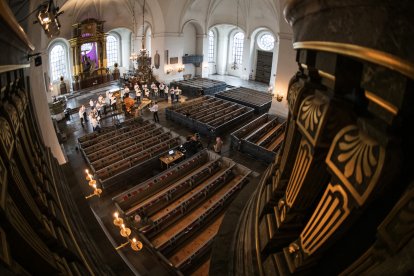Lutheran Church of Sweden closes seven historic churches for not complying with green agenda
Church leadership has launched a climate roadmap that wants to end any use of fossil fuels, no matter how old the facilities are.

Liturgical concert in a Swedish church.
Churches on the island of Gotland, Sweden, that are heated by fossil fuels have been closed. Despite being historic temples, hundreds of years old, with a rich cultural heritage, such is the decision of the Church of Sweden, which says it must meet its climate sustainability goals.
In total, there are seven churches that the Church of Sweden has closed on the island of Gotland, located 90km east of mainland Sweden and inhabited by more than 60,000 citizens. These churches are heated in winter with gasoline-powered heaters and the Church claims this is in breach of its climate agenda.
The churches will therefore remain closed until May, when average temperatures rise enough to do without heating. The Lutheran Church assures that it does not currently have the means to reform the heating systems of the seven temples for another one that respects its new climate regulations.
The drama is for the followers of Christ on the island of Gotland, who are left during the winter months without any place of worship to go to. Some testimonies collected by the Swedish public radio testify that the faithful are "disappointed" since their Church has abandoned them in order to comply with climate mandates.
Church of Sweden climate roadmap
The evil of the parishioners stems from the progressive efforts of the Church of Sweden, which for years now has taken a woke turn very similar to that of the Anglican Church.
For years, the Church of Sweden has incorporated women into the clergy. More recently, from its top, priests were urged to deliver mass with inclusive language. The current leadership of the Lutheran Church is in the hands of Antje Jackelén, the first woman to hold the post of archbishop.
As part of her governance plan, she has encouraged an environmentalist roadmap as a pillar of reform for the Church. It is this climate sustainability agenda that is behind the closure of the seven Gotland churches.
The roadmap stipulates that "the Church of Sweden is to be climate neutral by 2030, with no net contribution to global warming. This goal shall be achieved mostly through emission reductions within the Church of Sweden's own activities, as well as other actions for conversion at national and global levels."
RECOMMENDATION





















